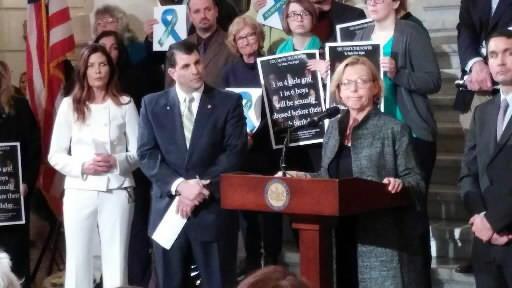|
Child Sex Abuse Victims Will Have to Wait Another Year
By Bill White
House Bill 1947 is dead for this legislative session. The landmark bill extending Pennsylvania's criminal and civil statutes of limitations for child sex abuse survivors achieved a remarkable degree of consensus, considering how many years similar bills have been buried in committees by legislators cowed by Catholic Church and Insurance Federation lobbying pressure. But it ultimately fell victim to the unwillingness of Senate leaders to allow a vote on retroactive access to civil lawsuits for child sex abuse survivors blocked by current and past statutes of limitations. After a strong compromise version of HB 1947 passed the House 180-15 this spring, the retroactive portion of the bill was removed in the Senate Judiciary Committee, which also added a weird preamble laying out its claims that civil radioactivity is unconstitutional. The Senate passed that watered down bill, presenting House leaders and the bill’s advocates with a difficult decision: Should they accept the weaker bill, which nonetheless constituted a big improvement on present statutes, and address retroactivity again next session? Or should they rewrite the bill again, removing the unacceptable preamble and restoring retroactivity, knowing it was unlikely the Senate would vote on such a bill again this session? In the end, state Rep. Mark Rozzi, D-Berks, the bill’s strongest legislative advocate -- and himself, he has said, a victim of child sex abuse by a priest in the Allentown Diocese -- told me today that they have decided to do neither. Faced with the certainty that Senate leaders wouldn’t permit a vote on any bill permitting retroactivity, they’ll just let the bill die and start again next year. “There was no movement on their side,” Rozzi said. “They refused to compromise on anything. We’re not going to accept half a loaf for our children.” He added, “To me, what the Senate is saying here is simple. It's more important to stand with pedophiles and institutions protecting pedophiles rather than victims of sexual abuse.” Nonetheless, he said, he’s proud of what they did accomplish this session, particularly in the face of heavy lobbying by the state Catholic Conference and state Insurance Federation. “We counted 39 lobbyists working against us,” he said. When it passed the House, HB 1947: -- Eliminated criminal statutes of limitations for child sex abuse. -- Extended the statute for civil cases until the victim reaches age 50, retroactively, from the present age 30. This represented a compromise from advocates’ real preference, which is a two-year window in which all victims would have court access without regard to their age. -- Lifted sovereign immunity protection shielding public entities such as public schools in child sex abuse cases in which there was gross negligence. The retroactive piece has strong resonance with survivors because it ensures that present, future and past victims get the opportunity to name and confront their abusers, which in some cases has been denied by intentional institutional efforts to cover the crimes up until the statute of limitations expired. In some instances, including several in which I’ve talked to the victims, allowing such court access would finally reveal the names of abusers who have been able to remain hidden for decades so they could seek new victims. There are no grand jury reports to expose all the family members, family friends, coaches and other predators who have abused children. The Senate’s argument that such access is unconstitutional took a heavy blow when new state Attorney General Bruce Beemer asserted not long ago that he believes it is constitutional, the same position the office has taken in grand jury reports on Catholic Church child sex abuse in Philadelphia and Altoona-Johnstown. The revelations arising this year from the Altoona-Johnstown grand jury report, combined with an Oscar-winning movie on the Boston Globe’s investigation into similar abuse in Boston, provided the momentum to help drive HB 1947 onto the House floor. The fact that grand juries have been meeting this year to consider abuse in other Pennsylvania dioceses was an important factor in the decision to insist on a stronger bill in the next session. If legislators were feeling pressure from their constituents this year, think what it will be like when several more reports surface? Rozzi is convinced that passing the watered-down bill would have taken the heat off the legislators who are resisting these changes. “I want victims to know that even though we may have lost this little battle right here, know that we are never giving up. We will win this war. Justice will prevail someday. It wasn't our day today, but we will continue to fight.” Rozzi thanked House Majority Leader Dave Reed, R-Indiana; House Speaker Mike Turzai, R-Allegheny; and Minority Leader Frank Dermody, D-Allegheny, for their support. He said Reed has promised to make this a priority again next year. “Senate leaders will not be able to let the clock run out again, like the bishops did with the statutes of limitation for all those traumatized children and their families,” he wrote today in a release titled “What Happened to House Bill 1947?” He concluded, “With six more Roman Catholic dioceses under investigation, you can be sure this problem is not going away … and neither are we.” Contact: bill.white@mcall.com
|
.
Any original material on these pages is copyright © BishopAccountability.org 2004. Reproduce freely with attribution.
